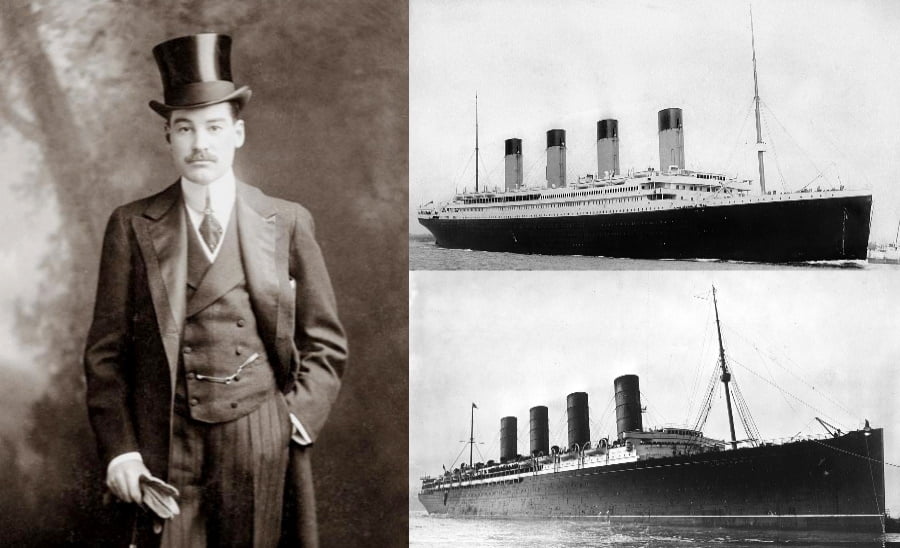According to widespread information, one of the richest people of his time was first very lucky, and then catastrophically unlucky. We checked to see if this was the case.
The sinking of the largest transatlantic liners of its time: the Titanic (1912) and the Lusitania (1915) within three years of each other caused shock in the Western world and is still the subject of numerous works of art. The role here was played not only by the number of victims (in both cases there were more than a thousand), but also by the representativeness of some of them. The cream of society of their time: industrialists and politicians, actors and scientists - by the will of fate, ended up on one of the ill-fated flights. Some of them, fortunately, managed to escape. And others avoided the test altogether by leaving the flight at the last moment. Among the latter, many sources name the American multimillionaire Alfred Gwynne Vanderbilt. According to the book by Milos Hubacek "Titanic", “an industrial and financial magnate and his wife abandoned the trip just before sailing. Their valet, maid and luggage remained on the ship and four days later they sank along with the Titanic.” The magazine also writes that Vanderbilt returned the ticket at the last minute. Time. According to Internet portal authoritative Smithsonian Institution, Alfred Vanderbilt canceled his return from Europe on the Titanic so late that the first newspapers after the news of the death of the ship generally included him in the list of passengers on the liner.
Let's start from the end. Alas, there is no doubt about the death of Alfred Vanderbilt aboard the Lusitania. A German submarine torpedoed the passenger liner on May 7, 1915, when it was already in the final stages of its journey from New York to Liverpool. Vanderbilt, who probably due to his status should have had no problem being accommodated in a lifeboat, behaved heroically. The American, who could not swim, managed to help other passengers into the boats during the 18 minutes that the ship sank, and when they were full, he put his life jacket on a young woman with a small child. Vanderbilt's exploit made him the protagonist of David Butler's best-selling novel "Lusitania".
The situation is more complicated with the first question: did Alfred Vanderbilt book a ticket on the Titanic? In theory, the simplest clue here might be the fate of the multimillionaire's valet and maid. IN official report The US Senate, released in the same 1912, among the passengers of the Titanic you can see the name of a certain Edwin Wheeler, who is listed as a servant of Mr. Vanderbilt:

The history of the liner's passengers has been well studied. On the website Encyclopedia Titanica Almost all available information about them, including biographies, has been collected. There is also a page about Edwin Wheeler. Here's what it says, in particular:
“In New York, Wheeler took a job as a footman for the famous businessman and art collector George Washington Vanderbilt (1862–1914), owner of the largest home in the United States, the Biltmore House in Asheville, North Carolina.
The Vanderbilts, along with their employee Wheeler, traveled to Europe in early 1912 and planned to return to the United States on the maiden voyage of the Titanic. On April 30, 1912, The New York Tribune reported that Mrs. Vanderbilt's mother, Mrs. Dresser, learned of their plans and insisted that they cancel their trip because it was dangerous to take the first flight. Mr. and Mrs. Vanderbilt complied with Mrs. Dresser's wishes and boarded the Olympic, which left earlier and arrived in New York on April 10th. That same day, Edwin boarded the Titanic at Southampton on second class ticket No. 2159, which cost £12, 17 shillings, 16 pence. Its main purpose was to escort the Vanderbilts' baggage across the Atlantic.
Edwin Wheeler died when the ship sank. If his body was found, it was not identified.”
The description of the elder Vanderbilt's conversion is obviously in error, since Mrs. Vanderbilt's mother, Susan Dresser, died in 1883. Nevertheless, it turns out that the valet who died on the Titanic was not Alfred Gwynne Vanderbilt, but George Washington Vanderbilt, who, upon closer examination, turned out to be the uncle of our hero.

The Encyclopedia Titanica also contains a list of people who canceled their tickets at the last minute. In it we once again find confirmation the fact that George Vanderbilt and his wife left the flight, but there is no mention of Alfred there. The list is quite neat, and some passengers even have their cabin number listed, so there's no doubt that if George Vanderbilt's nephew had booked a ticket (and it would probably have been first class), we would have known about it.
How then did Alfred Vanderbilt get into this whole story? He was indeed in Europe with his wife Margaret and, quite possibly, planned to return. At least his worried father-in-law Isaac Emerson, shortly after the news from Atlantic, received a telegram from his son-in-law with the following content: “Margaret is fine. Not on the Titanic. Alfred". This was reported by the Baltimore Sun, which also shared the following information:
“All the Titanic passenger lists telegraphed by White Star Line officials included the names of Mr. and Mrs. Vanderbilt. The only explanation that friends of the Vanderbilts give is that they may have intended to sail on the Titanic and changed their minds at the last moment. Mrs. Emelie Emerson, Mrs. Vanderbilt's mother, said she received a letter last week from her daughter in which she wrote that she and Mr. Vanderbilt had plans until April 1 and did not know what they would do next.”
From all this we can conclude that the confusion was caused by a combination of two circumstances: Alfred Vanderbilt's friends and relatives did not know about his whereabouts, and the names of "Mr. and Mrs. Vanderbilt" that appeared in the newspapers referred to the older couple of relatives. So, of two catastrophic accidents, Alfred Vanderbilt could have been affected by one - and, alas, it was affected by one.
Half-truth
Read on topic:
1. "Titanic" Disaster. Report of the Committee on Commerce, United States Senate.
2. Encyclopedia Titanica. Titanic passengers that canceled or missed the crossing.
3. Eric Sauder, Brian Hawley. A Titanic Mystery
If you find a spelling or grammatical error, please let us know by highlighting the error text and clicking Ctrl+Enter.







